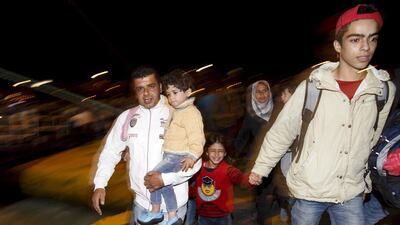Palestinian Authority president Mahmoud Abbas has recently called for Israel to facilitate the absorption into the West Bank of Palestinian refugees fleeing Syria. Mr Abbas has asked the PA ambassador to the United Nations, Riyad Mansour, to cooperate with UN secretary general Ban Ki-moon to "take appropriate and necessary measures to absorb displaced Palestinian refugees into the Palestinian territories" – to bring them home.
According to the PA’s official news website, Wafa, the PA is looking for international help to “stop the Palestinians’ plight of displacement, death and dispersal in world countries due to the current difficulties in the region”.
Acknowledging this, Isaac Herzog, the leader of the Israeli centre-left opposition, the Zionist Union, declared that the Israeli government should strive "toward receiving refugees from the war in Syria" and tied his assertion to the historical narrative of dislocation Jewish people have faced in past conflicts. However, he did not explicitly mention Palestinians and their right of return as enshrined in UN resolution 194.
In keeping with his usual catch-all rhetoric, prime minister Benjamin Netanyahu declared that he will “not allow Israel to be submerged by a wave of illegal migrants and terrorist activists”.
Mr Netanyahu’s words may sound like a chorus taken from the same demagogic hymn sheet of some far-right European leaders towards the Syrian refugees. However, it is because of Israel’s unique historical responsibility to the Palestinian people – the people it has systematically dispersed since the 1948 mass displacement of up to 800,000 Palestinians from their homes – that it should play a constructive role in facilitating entry to Palestinian refugees fleeing Syria into the West Bank.
It seems that Mr Netanyahu is indifferent to consigning Palestinians fleeing Syria to the grim portents of triple displacement, and to the mounting number of people who have drowned at sea attempting to make the perilous journey to Europe.
During the mass dispossession of Palestinians in 1948, about 90,000 fled to Syria as refugees. Since then, several hundred thousand more have arrived and entered refugee camps such as the infamous Yarmouk camp just 8 kilometres outside the Assad regime’s stronghold in Damascus.
Palestinians have not been immune from the tidal wave of destruction that started sweeping Syria in March 2011. The Yarmouk camp, which was home to Syria's largest Palestinian community of about 18,000 people, has been subjected to a three-year-long siege by the Assad regime and allied militias in an attempt to root out opposition forces. It has also been the battleground for fierce fighting between ISIL militants and forces loyal to Syrian president Bashar Al Assad.
It has been estimated that the blockade of Yarmouk has resulted in the deaths of about 1,000 Palestinians refugees. Since ISIL entered the camp in early April, several thousand Palestinians have reputedly fled. According to the UNRWA, “all 560,000 registered Palestinian refugees in Syria have been affected”. It also estimates that 95 per cent of the 480,000 Palestinian refugees remaining in Syria are in need of humanitarian aid.
Syria under the rule of Bashar’s father, Hafez, was a self-declared bastion of Arab resistance to Israel’s presence in the Middle East. Because of this, Hafez, who died in 2000, made it his mission to ensure that Palestinian refugees enjoyed more rights in Syria than those languishing in refugee camps in other parts of the Arab world.
Thus for Mr Al Assad, the symbolic value in preserving the stability of the Palestinian community in Syria was high. However, his inability to do so, in combination with the often wanton destruction caused by his own forces against Palestinian communities such as Yarmouk, has contributed to the perpetuity of Palestinian displacement.
The immiseration caused by the Syrian conflict is not confined to the Palestinians; they are not the only people affected by the unfolding power struggles and proxy wars. However, a displacement of people on this scale must be met with constructive policies by all regional parties who have the capacity to take refugees – especially countries that have a historical culpability for banishing hundreds of thousands of these people to the perpetual diaspora in the first place.
So far, more than 350,000 refugees have been detected on EU borders, and more than 2,600 have died tryingto cross the Mediterranean. Many in the international community have excoriated certain European governments for “not doing enough”. Yet Israel, an ostensible island of “freedom and democracy” in the Middle East, continues to turn a blind eye.
Despite the fact that Israel has dispossessed Palestinians in massive numbers, its leaders refuse to acknowledge their historical duty towards the Palestinian people. Israeli leaders still propound their concerns that facilitating refugees from Syria will “open a back door to the discussion on the Palestinian right of return”.
What stands out about this rhetoric is that it suggests Israel has made the decision to ignore the plight of Palestinians refugees not because of infrastructural or economic constraints, but because it fears such moves could undermine its aspirations to preserve a Jewish majority demographic.
Until Israel is pressured into facilitating even the slow transfer of Palestinian refugees into the West Bank from Syria, not only will Palestinians continue to languish in the diaspora, they will continue to make up another group of dislocated peoples, ready to make the treacherous journey across the Mediterranean.
Matthew Ayton is a freelance writer and researcher in the West Bank

